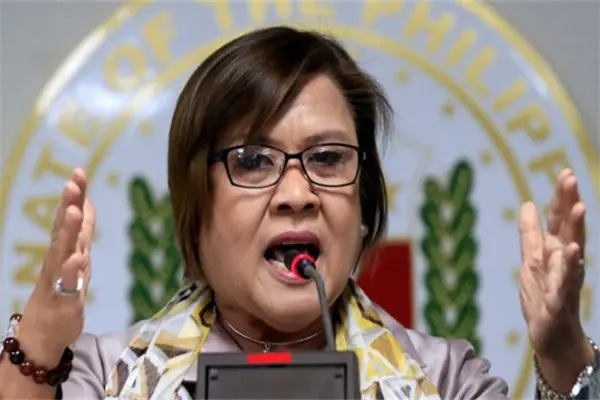Philippine prosecutors have filed drug-related charges against a senator who is an outspoken critic of President Rodrigo Duterte's war on drugs.
Senator Leila de Lima is accused of receiving money from detained drug lords.
A former top human rights official, she has denied the claims, calling them "politically motivated".
More than 7,000 people have been killed since Mr Duterte launched his war on the drug trade in July 2016.
Critics say he has encouraged police, vigilantes and mercenaries to shoot suspected drug dealers and users on sight.
Mr Duterte has defended the crackdown, saying police were only authorised to open fire when threatened by suspects.
'Butchery'
Ms De Lima, who served as justice secretary under Mr Duterte's predecessor, Benigno Aquino, has been one of the most vocal critics of the crackdown.
When she served as chair of the Commission on Human Rights between 2008-2010, she investigated Mr Duterte - who was then mayor of Davao City - over unexplained deaths during his anti-crime campaign.
She is now accused of accepting money from jailed drug lords and allowing a convict to run a drug operation from behind bars.
Justice Minister Vitaliano Aguirre said three charges had been filed against Ms De Lima, her driver and a number of other people. "This is not the product of politics, this is the product of drug trading,'' he said.
Ms De Lima has strongly rejected the allegations.
"If the loss of my freedom is the price I have to pay for standing up against the butchery of the Duterte regime, then it is a price I am willing to pay,'' she said in a statement.
"But they are mistaken if they think my fight ends here. It has only begun.''
Mr Duterte suspended his crackdown last month after the killing of a South Korean businessman inside police headquarters. He said the police force needed to be cleaned up and has now ordered the Drug Enforcement Agency, rather than the police, to lead it, with back-up from the military.
The death toll from the crackdown has attracted intense criticism from human rights groups and Western countries, although the president continues to enjoy a high level of support among Filipinos.
(BBC)
 简体中文
简体中文

